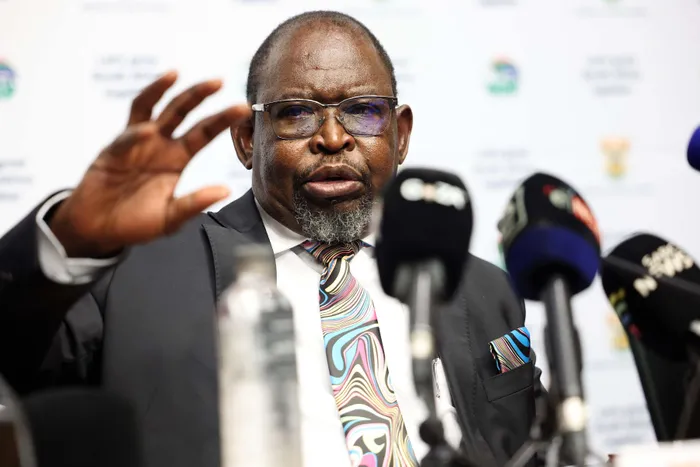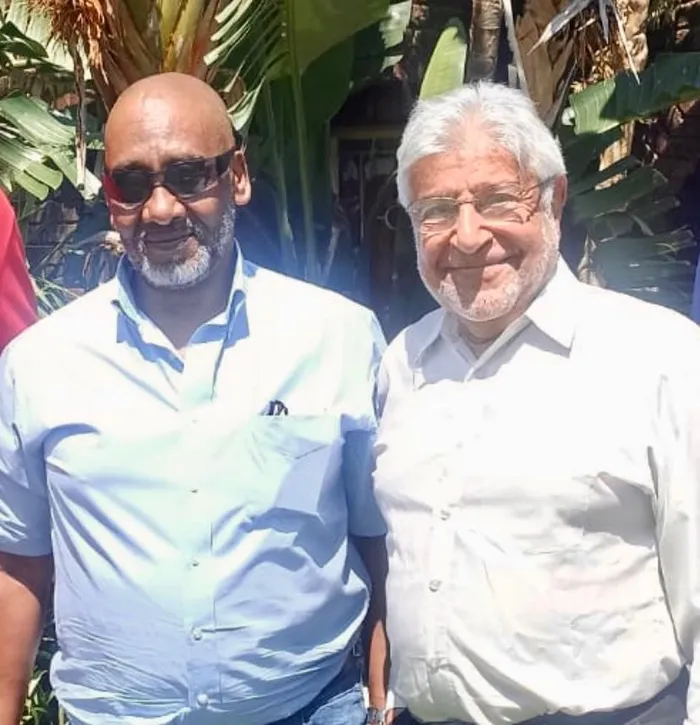Godongwana must now answer to R1.35 trillion claim

Finance Minister Enoch Godongwana.
Image: Jairus Mmutle | GCIS
THE Gauteng High Court, Pretoria has given the green light for Finance Minister Enoch Godongwana to be cited as a respondent in a lawsuit filed by a family against the Public Investment Corporation (PIC), regarding the payment of R1.35 trillion — funds believed to be held by the PIC.
The legal wrangle concerns the wife and executrix of the estate of the late Abdul Razak Tayob Surtie.
The Surtie family states that the late Surtie is the beneficiary of offshore inheritance assets, which were repatriated in 1984 after the process was initiated by the Lesotho Branch of Barclays Bank Limited.

Jeff Koorbonally (left), forensic investigator who is assisting the Surtie family in their claim against the PIC and finance minister, with former Judge AB Mahomed.
Image: Supplied
The Surtie family has been embroiled in protracted legal proceedings in a bid to recover the money from the PIC.
They have, this week, with the assistance of Edward Jeffrey Koorbanally, a financial and forensic expert instructed by the family to assist them in instituting the claim, obtained a Gauteng High Court, Pretoria, order allowing for the minister to be added as a respondent.
The Absa Group remains the second respondent.
In their now-amended summons to include the minister, the claimants demand payment of R1.35 trillion from both the PIC and the minister — jointly and severally, with the one paying the other to be absolved, as well as interest as from 2019.
The source of the funds was from diamond mining claims and investments done with a share certificate portfolio, after having been involved in commercial trade as far back as 1896.
The Share Certificate Portfolio Number 7315 is globally recognised as a financial trading instrument for precious metals and is commonly known as trust bonds, paying dividends every three years.
The plaintiffs said the share certificate and the accompanying rights and obligations were transferred to the deceased in 1923, and by operation of law, the deceased became the beneficiary of the assets and funds held by the certificate.
The share certificate was put on the stock exchange trade with the London Stock Exchange, which was managed by Barclays Bank International.
Koorbanally has established from the Absa Group that assets relating to the share certificate belonging to the deceased, of $36 billion, were transferred into the deceased’s account in 1984.
Six months later, it was converted to South African currency, in the amount of R87.84bn. It is said the funds were invested in government bonds, and the amounts earned from the investments equaled a total of R1.35 trillion.
The funds, it is said, were deposited into a special restricted account in the 1980s. Under the apartheid government’s regulations and laws, such payment was prohibited. The PIC subsequently invested the funds in South African government bonds, which were underwritten by the South African Reserve Bank, the claimants said.
According to the summons issued against the PIC and Absa, in October 2001, the value of the bonds was respectively R77.3bn and R91.9bn. They said the Financial Services Board (now Financial Sector Conduct Authority) confirmed the bonds in USD denominations.
In the latest developments, Koorbanally and the family say in the amended plea that the minister acted unlawfully when he directed that the money should be retained by the PIC.
The claimants argue that without mandatory relief from the court, they will suffer irreparable harm, as the PIC will not be required to repay the assets without a decision from the minister.
While this legal saga has been dragging on for years, Koorbanally has said that there is a possibility that an out-of-court settlement could soon be reached between the parties.
Cape Times